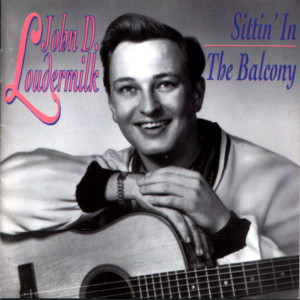

By Dave Austin, “Music Professor”
I was wandering through one of the music stores in Nashville some time back and I struck up a conversation with another fellow as we were inspecting some item of gear. After a few moments, we got round to introducing ourselves and he told me his name was John Loudermilk. My mind immediately flashed to a particular vinyl album in my collection and I said, “There’s a famous singer-songwriter by the name of John D. Loudermilk.”
“That’s my father,” said John proudly and we launched into a rather long conversation about his famous dad.
You’re not familiar with the name of John D. Loudermilk? I’ll bet you are familiar with quite a number of his songs.
John, Sr. was born in Durham, North Carolina, and grew up in a family who were members of the Salvation Army, and as a youngster, he was heavily influenced by church music. His cousins, Ira and Charlie Loudermilk were successful country musicians, known professionally as the Louvin Brothers.
Early on, JDL wrote a poem that was later set to music, producing the 1956 George Hamilton, IV country-pop hit, “A Rose and a Baby Ruth.” Shortly thereafter, Eddie Cochran produced his first hit with Loudermilk’s “Sittin’ in the Balcony.”
If you’re a vinyl collector as I am, somewhere in your collection you may chance to have a disc or two by the artist, Johnny Dee (Loudermilk’s early professional name), recorded on the North Carolina-based Colonial Records label. (There are also two other artists who record under the Johnny Dee name.) He was also known to use the pseudonym, Ebe Sneezer on occasion.
In 1958, Loudermilk moved to Columbia Records and recorded five flops during 1959. However, two years later he signed with RCA Victor and began cranking out Top 100 hits such as “Language of Love,” “Thou Shalt Not Steal,” “Callin’ Doctor Casey” and “Road Hog.”
As 1963 rolled around, Loudermilk made his mark as a songwriter with “Abeline,” recorded by George Hamilton, IV, with whom JDL had a decade-long collaboration. Working in Nashville, Loudermilk soon became one of the most prolific songwriters of the 1960s and ‘70s, writing top hits for the Everly Brothers, Johnny Tillotson, The Nashville, Teens, Paul Revere & the Raiders, Johnny Cash, Sue Thompson and numerous others. Guitar players may instantly recorgnize his “Windy and Warm,” which has been recorded by more than 100 artists!
He wrote a song called “The Pale Faced Indian,” which later became “Indian Reservation.” There’s an interesting story about how Loudermilk came to write this song after his car was snowed in and he was taken in by Cherokee Indians and given shelter in a cave on their reservation. He claims that the chief asked him to write a song about the plight of the Indians on the Trail of Tears. As the result of the song, Loudermilk was awarded the first medal of the Cherokee nation. When reading through an old ledger book from the Trail of Tears, Loudermilk discovered his great-grandparents, at the age of 91, were force-marched 1,600 miles to a reservation. Further, it’s said that JDL tricked DJ Casey Kasem into believing this story was true and Kasem broadcast it for twenty-five years before learning that Loudermilk had duped him.
Loudermilk’s most played songs over the past five years are #1: “Turn Me On,” #2: “Tobacco Road,” (covered by dozens of artists), #3: “A Rose and a Baby Ruth,” #4: “Sittin’ in the Balcony,” #5: “This Little Bird,” #6: “Then You Can Tell Me Goodbye,” and #7: “Indian Reservation.” His list of songs is far too extensive to list here, but it numbers into the hundreds, ranging from quirky novelty tunes to serious and thoughtful compositions to hard-nosed blues. Although I cannot immediately find the reference at this writing, I recall reading that Loudermilk has more than 400 of his songs recorded by other artists!
Loudermilk stepped back from the music scene in the 1980, expressing his desire to have more family time and delve into the study of ethnomusicology.
Tragically, JDL’s home caught fire in 2005 and, according to his son, hundreds of unpublished songs and many items of his memorabilia were lost. However, Loudermilk and his wife were unharmed. Today, he lives quietly in a small rural community near Nashville.
In 1976, John D. Loudermilk was inducted into the Nashville Songwriters Hall of fame and in 2011, into the North Carolina Music Hall of fame.
